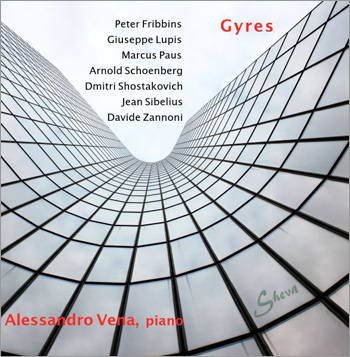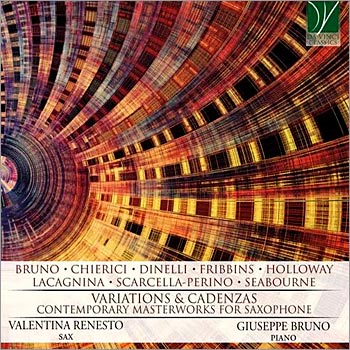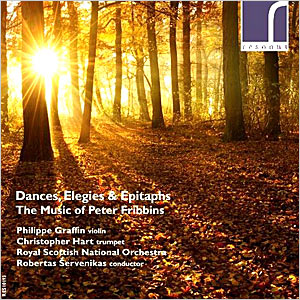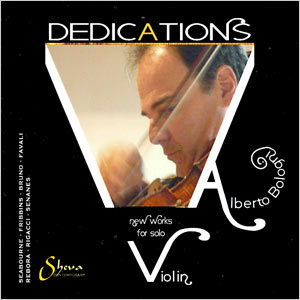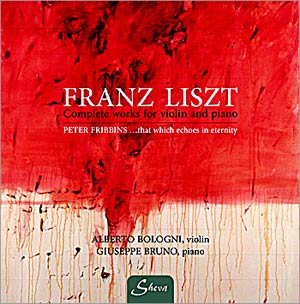CD Releases
Due for CD & digital release on 7th Nov 2025
FRIBBINS: Cello Concerto • Gommecourt • Folk Songs
An album of new orchestral works by Peter Fribbins. Gommecourt, a four-movement symphony with obbligato piano, traces the dramatic story of his grandfather, Tom Fribbins, at the Battle of the Somme in 1916. It is paired with the passionate, and at times wild, Cello Concerto, and the beautiful melodic lines of his Folk Songs for viola and chamber orchestra. Released in surround sound with Dolby Atmos.
Information
SHEVA 192 GYRES
Artisti: Vena Alessandro
Compositori: Fribbins Peter, Lupis Giuseppe, Paus Marcus, Shoenberg Arnold, Shostakovich Dmitri, Sibelius Jean, Zannoni Davide
Information
Variations & Cadenzas: Contemporary Masterworks for Saxophone
- Artist(s): Giuseppe Bruno, Valentina Renesto
- Composer(s): Edoardo Dinelli, Giuseppe Bruno, Oliviero Lacagnina, Peter Fribbins, Peter Seabourne, Roberto Scarcella Perino, Robin Holloway, Sergio Chierici
- EAN Code: 7.93611610422
- Edition: Da Vinci Classics
- ormat: 1 Cd
- Genre: Chamber
- Instrumentation: Piano, Saxophone
- Period: Contemporary
Information
Dances, Elegies & Epitaphs: The Music of Peter Fribbins
Philippe Graffin (violin)
Christopher Hart (trumpet)
Royal Scottish National Orchestra
Robertas Šervenikas (conductor)
Resonus Classics is pleased to present a striking disc of orchestral and instrumental works by the British composer Peter Fribbins.
The Royal Scottish National Orchestra conducted by Robertas Šervenikas is joined by violinist Philippe Graffin and trumpeter Christopher Hart in a programme that includes the beautiful Soliloquies for Trumpet & Strings and the passionate Concerto for Violin & Orchestra titled Dances, Elegies & Epitaphs and dedicated to the memory of the composer’s father. Completing this portrait is Capriccio for orchestra, based on the hymn tune ‘Abide with me’ and wind quintet In Xanadu.
Information
SHEVA 171 LISZT Complete works for violin and piano
Artisti: Bruno Giuseppe, Bologni Alberto
Compositori: Liszt Franz, Fribbins Peter
Information
Peter Fribbins: Dances and Laments
Renowned for his passionate and direct musical voice, Fribbinss music convincingly mixes elements of traditional tonality and established forms, with contemporary ideas and approaches, to create a sound that is at once distinctive and deeply personal. Dominated by associations with poetry and painting, the new CD opens with The Zong Affair, a striking septet based on a painting by William Turner, expertly performed by the Turner Ensemble, comprised of principal players from the Royal Opera House and the Orchestra of the Age of Enlightenment. Dances & Laments follows, played by the wonderful French duo Philippe Graffin and Henri Demarquette. Then come two further duos: That which echoes in eternity for cello and piano (after Dante); and Porphyrias Lover for flute and piano (after Browning), again beautifully performed. The beguiling Softly, in the dusk (after D.H. Lawrence) follows, sensitively executed by the Rosamunde Piano Trio. The disc ends with its only abstract offering, a powerful Prelude and Fugue based on the English hymn tune Cromer, masterfully played by Michael Frith on the organ of Brentwood Cathedral.
Information
Renowned for his distinctive, passionate and direct musical style, this exciting new disc of music by Peter Fribbins follows the critically acclaimed ‘I Have the Serpent Brought’, first-class readings of Fribbins’s chamber music for strings which opened with the highly dramatic 1st String Quartet, released in 2010. The new CD opens with the equally striking 2nd Quartet, in a recording by the celebrated Chilingirian String Quartet. This leads, via a piano prelude on themes by Haydn, to the central work on the disc, Fribbins’s Piano Concerto, a significant new addition to the British concerto repertoire, performed by talented German pianist Diana Brekalo with the Royal Philharmonic Orchestra under Lithuanian conductor Robertas Šervenikas. Distinguished viola and piano duo Sarah-Jane Bradley and Anthony Hewitt complete the disc with Fribbins’s beguiling ‘Fantasias’ on Welsh and Hungarian folk songs. The disc, which offers a hugely enjoyable variety of works, takes its title from the indomitable lines of Omar Khayyám, which Fribbins uses to preface his powerful new Piano Concerto: The Moving Finger writes; and, having writ, Moves on: nor all thy Piety nor Wit Shall lure it back to cancel half a Line, Nor all thy Tears wash out a Word of it.
Information
The dramatic, expressive and highly melodic chamber music of the British composer Peter Fribbins, performed here by some of England’s finest chamber ensembles: the Angell Piano Trio, the Allegri Quartet and cello & piano duo Raphael Wallfisch and John York. The disc takes its name from the title of Fribbins’s first String Quartet ‘I Have the Serpent Brought’ after lines from John Donne’s remarkable 17th-century poem ‘Twicknam Garden’ on which it’s based. In 2007 the UK newspaper The Independent said Fribbins was ‘…one of the outstanding composers of his generation.’ This is a CD for all devotees of good string chamber music in the mainstream European tradition.
Videos
Programme Notes
Porphyria’s Lover

The title comes from the Robert Browning poem of the same name (1836). For me, this is a remarkable poem, full of passion, vivid imagery and imbued with touches of madness and distortion (here literally in the form of the disease porphyria) which seems typical of much Romantic art.
I have often in my mind paired the aesthetics of different poets and composers, and when I think of Robert Browning, I always think of Robert Schumann. There seem to be a number of parallels, not merely their chronology, but also their expressive worlds. A delicate, almost seductive madness and a slightly twisted reality seem so much a part of Schumann’s aesthetic and of this poem. Thus, this piece forms my musical response to the Browning through a kind of Schumannesque filter.
I have attempted in some way to capture the delicacy of Schumann, his elegiac side, the passion, and also that sense of early Romantic tender warmth (that on occasions can seem almost smothering and suffocating). The gentle madness takes the form of dissonant clusters, which return in different forms throughout the work (I was thinking in particular of the strange dissonances in ‘Einen Blumen’ from the piano pieces Waldscenen, Op.82). Also there is a recurring Brahms-like melodic idea (marked ‘teneramente’ in the score) which also returns in different Schumannesque guises, sometimes as a transparent shadow of before, sometimes darker and twisted, sometimes slower or quicker.
There are three movements: the quick central movement is followed by the last without a break.
The title comes from the first stanza of the remarkable poem by metaphysical poet John Donne entitled Twicknam Garden, which was probably written between 1610 and 1620:
Blasted by sighs, and surrounded with tears,
Hither I come to seek the spring,
And at mine eyes, and at mine ears,
Receive such balms, as else cure everything;
But O, self traitor, I do bring
The spider love, which transubstantiates all,
And can convert manna to gall,
And that this place may thoroughly be thought
True paradise, I have the serpent brought.
The poem provided the initial inspiration and stimulus for my string quartet, but the music is not intended to be programmatic in the nineteenth century sense. I suppose the dark opening chords may well sound like manna turning to gall, and the elegiac passion of the violin melody that weaves above is certainly connected to the first lines, but there are no further literal (or literary) parallels intended beyond perhaps subliminal associations.
I have found that a poem often gives me an initial expressive and poetic focus for a piece, but after some measures the music seems to take off in its own terms. For me the piece must work coherently, structurally and abstractly as music: if it can only be understood in terms of the images, metaphors and structure of the poem linked to the music, I would feel something of a failure, and perhaps even a charlatan. Although I enjoy nineteenth century music very much, some of the music I find unsatisfying because it does precisely that (perhaps that makes me more of a ‘Classical’ composer).
The dark, claustrophobic mood of the adagio opening continues into the following main Allegro, but now with energy and perhaps even menace. The adagio and allegro are motifically linked.
A short Adagio follows, much more diatonically tonal than the first movement, simpler, almost naïve, and conceived with luminous chords and transparent textures to form astriking contrast to the dark complexity of the first movement.
A brief Recitative movement draws upon the melodies of the very opening of the work and leads directly to an Allegro which gives a different and somewhat truncated perspective on the energetic, motific material of the first movement. It comes to a climax on held tremolo chords over which the violins recall the passionate melody of the opening. A brief moment of repose follows before the allegro bursts through and ends the music with violent finality.
I have the Serpent Bought
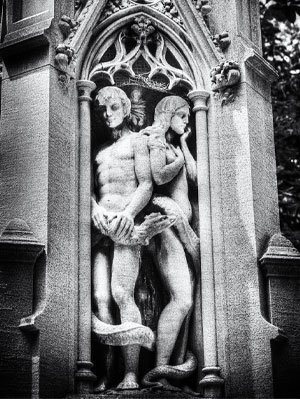
‘…one of the outstanding composers of his generation.’
The Independent
